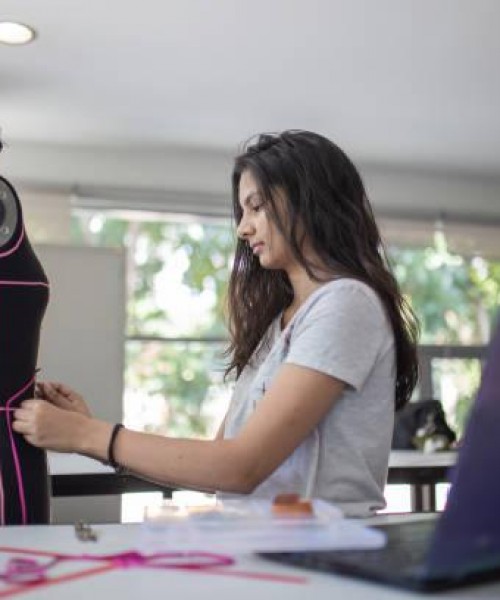Many rapper enhance their sense of attractiveness by emphasizing their possession of precious objects that others cannot afford. Foxy Brown, who adopted her moniker from the seventies blaxploitation movie protagonist of the same title, in "I'll Na Na" raps: "Uhh, rollin for Lana, dripped in Gabbana…/And y'all gon see by these mil's I possess/Never settle for less, I'm in excess." Foxy highlights here the fact that she wears expensive women's designer clothing that working class and middle-class individuals could not afford. Furthermore, the audience gets the message that Foxy earns millions of dollars from her rapping. She also admits she is not willing to settle down and start a family but would rather live in abundance of material goods on her own. A vast majority of the female artists mentioned owning luxurious products of mass consumption. Obviously, possession of extravagant material goods are crucial for many contemporary female artists. Material success, fame, and sexual satisfaction is their achieved American Dream. Similarly to male rap artists who glamorize life a of a pimp, these female artists present themselves as physically attractive to possible mates as well as in possession of goods that regular people do not and cannot acquire. This type and degree of overconfidence permeates throughout rap music and is common to both sexes of rappers. It illustrates artists' abilities, or their dreams, to overcome obstacles (unattractiveness, lack of money) and eventually achieve (sexual and material) success.
The partying, alcohol and drugs abuse is a frequent theme also in "Sistas with Attitude" rap music. In the overall sample in Oware's study of 44 female hip hop songs of the nineties, in each song there was an average of one-and a-half references made to alcohol or drugs. For instance, in her song "Deeper," rapper called Boss refers to both alcohol and drug use. In these lyrics, Boss is indulging in a popular malt liquor, and also smokes "chronic," a strong form of marijuana mixed cocaine. Another song by Queen Pen, "Party Ain't a Party," presents: "I'm tipsy from the cab, down the whole bottle of Henney/ Is you dealing with the cat that's blunted." Queen Pen's alcohol is Seagram's Hennessy and "blunted" means being under the influence of marijuana. These female rappers refute the stereotype that women refrain from "hard" alcoholic drinks and illegal drugs.. These women depict themselves as being equal to men by engaging in similar potentially harmful behaviors.
Another feature of rap music that is often taken up by female rappers is disrespecting or 'dissin', which is the act of verbally insulting an opponent. Dissin' allegedly has its origins in West Africa, among tribes such as the Efik in Nigeria and later could be found in early African-American oral traditions. Smitherman writes "women rule when it comes to signifying…female rappers use this age-old rhetorical strategy to launch critical offensives…" Traces of such style can be found in the verse rapped by Heather B.: "Fuck how much you sell cause, I read your album cover/You couldn't write a jam if your last name was Smucker". As "jam" may also mean a "hit song" she ridicules here the amount of records sold by her opponent while dissing his writing skills contrasting them with a popular food product brand Smucker's Jam.
Most disrespecting attitudes were pointed at males who attempted to pursue women with pretentious tales of sexual gratification. While some rappers resorted to warning of the potential suitor who must approach them in a courteous manner or gets rejected, other rappers would openly ridicule males sex skills and their fear of women's sexuality. Considered to be one of the most overt and explicit rappers, Lil' Kim in "Hardcore" rhymes: "The sex was wack, a four stroke creep…/(later he asked) Could he come over right fast and fuck my pretty ass?/I'll pass, nigga dick was trash." The rapper sets here her own conditions for a sexual intercourse. She keeps men under control and reserves the right to choose her partner by assessing his sex skills. She also implies what is surely feared by most of the heterosexual males - to be ridiculed by a woman for poor sex performance. Black males in particular who have been trying to conceal the image of an emasculated black man may feel highly sensitive about it. As many instances of male rap hits presented in the first chapter show that they tried to apply many strategies to regain their control over women. Boasting about their sexual hyper skills was a frequent topic.
Gangsta Boo, a successful "Sista with Attitude" of the late nineties and early twenty first century, touches upon similar themes in her lyrics: " Ha-ha, hey, Ladies check this out/ Well, let me tell this story about this nigga/ With a little dick but when it's hard, he's swearin' it (is) bigger/ I'm not to be the one guess you ain't got much to offer." Here, Gangsta Boo speaks directly to women about false male machismo. Boo, similarly to her counterpart Lil' Kim sets the norms here and evaluates whether her possible mate lives up to her expectations. When finds out that the man is poorly endowed she ridicules him in front of other women. Hence, as Rose writes you have women speaking to men, engaging in critiques of supposed male sexual prowess; in addition, they are speaking to other women about the failed attempts of these men to satisfy them sexually. These "disses" provide a female response to male rappers' chauvinism, misogyny and bragging about their sexual potency.
Similarly empowering themes also permeate throughout the songs and lyrics that present female sexuality. Several popular female rap artists depicted themselves as explicitly sexualized. Lil' Kim in one of her songs vulgarly demonstrates her acting upon a partner and presents herself as not submissive in sexual relationship." She clearly rejects here the romantic archetype of a pure virgin who is overtaken by more experienced lover. Yet, Kim is not a 'ho,' in hip hop vernacular, because her sexuality is not being exploited by her mate, she does not submit to his wants or desires for his satisfaction; rather she gains sexual gratification from this encounter. In hegemonic discourses surrounding women's sexuality, women are silenced or are not allowed to derive pleasure from sexual intercourse with males. Kim articulates her pleasure.
Oware in his study notes also another explicitly sexual song of Lil' Kim's fellow "sista" Trina where she raps: "G-string make his dick stand/Make it quick then slow head by the night stand/See I fuck him in the living room/I make him eat it while my period on." Similarly to Lil' Kim, Trina controls the sexual relationship with her male partners. Also, in her narrative, she makes her male partners perform oral sex while she is menstruating, a level of vulgarity that many heterosexual males would find mortifying. Although this new level of vulgarity was introduced mainly by "Sistas with Attitude", similar motifs can be seen in the songs of before mentioned "Fly Girls" such as Salt-N-Pepa. Even though they characteristically had lyrics that empowered women, also had lyrics where they sexualized themselves: "I throw it like a pitcher, let my sex appeal hit ya/ Game so sharp that it split ya." The single was released in 1998 which may imply that some "Fly Girls" opted to adjust to the common explicit, raunchy style of the late nineties and first decade of the twentieth century. Similar path have chosen some representatives of "Queen Mothers" who also shared similar coarse style in some of their late nineties songs. MC Lyte in one of her Grammy- awarded songs raps about a "ruffneck" but she does not condemn his involvement in criminal activities there. Instead she assures her listeners what is her main interest: "But he don't gotta be large to be in charge/Pumpin' in and out and out and in and here we go/He's got smack it, lick it, swallow it up style."
As we can see by above examples, sexually explicit lyrics exist in second wave 1990s female rappers songs. Furthermore, some female pioneers who are known for songs espousing the positives of womanhood also employ overtly sexual lyrics in some of their songs during this time. They risked their well established, positive image by collaboration with the controversial, coarse style of rap which gained prominence recently. This contradiction potentially undermines any empowering messages that these rappers used to convey. "Sistas With Attitude" not only presented themselves in overly sexualized ways, but as stated before they also used language that would be considered derogatory and demeaning to women. The majority of the female artists in my sample referred to themselves or other women as 'bitches.' Reclamation of 'bitch' by female rappers may be perceived not only as a tool for self empowerment as "Queen Mothers" and "Fly Girls" would argue. The word metaphorically translates as a demeaning and derogatory word usually targeted towards women. However, the word holds multiple meanings in rap music, particularly in songs by female rappers. Whilst "Fly Girls" would explain the word denotes a positive and strong woman, "Sistas with Attitude" extend the definition to an assertive female who subverts patriarchal supremacy. In her song "She is a Bitch," Missy Elliott writes uses the word 'bitch' to describe a person with lyrical skills, who can motivate and excite an audience. Self-evident from the title, "Da Baddest Bitch" rapper, Trina, metaphorically speaking, expresses how she is the best at rhyming and sexual activities. Following in the tradition of the "bad nigger" tales of the late nineteenth century, these bad girls of hip hop present themselves as the best at their craft, although employing non-normative and masculine language.
According to Rose in cases where females' music departs from males to greater extent there are more instances of empowering lyrics about women. Although these female rappers' lyrics consist a lot of references to indulging in low entertainment as consumption of alcohol and drug, as well as engaging in disrespecting acts of verbal abuse, several songs found in the Billboard charts deal with more serious issues. There are songs that take into consideration domestic violence, female self-determination and power, and sexuality from the perspective of women. For instance, in her song, Eve casts a bright light on the matter that is seldom discussed in rap music and in the African American community - domestic violence: "How would you feel if she held you down and raped you?/What kind of love from a nigga would black your eye?/Smacked you down cause he said you was too tall for him, huh?" Female rappers while talking about various issues also shared other similarities with male rappers, such as excessive use of violent lyrics. "How could you beat the mother of your kids?" In this song Eve argues from the standpoint of the victim. Her female friend is beaten, raped, and eventually killed by her abuser. In the song she asks the victim about why she stays with the oppressor and later she confronts him about his actions. In the end, Eve kills the abuser. Her song reverberates as a warning alarming all women against becoming trapped in dead end, toxic relationships. As Haugen argues in his discussion on female gangsta rappers, a woman's act of articulating and bringing up forms of oppression to the public eye is itself an act of their self re- empowering and rejection of any forms of domination.
Despite the above example of a song taking up serious matters, overall image of "Sistas with Attitude" seems to be rather associated with raunchiness, and explicit sexual lyrics. As Keyes presents in her study, many observers of female rap do not consider "Sistas with Attitude" serious artists. They accuse them of misusing the feminism and controversy and diminish Black male.
At the turn of the century new category of black female rappers emerged on the hip hop scene - "Lesbians". Although hip hop is considered to serve as a means of expression for those who felt alienated and outraged it is also perceived as extremely homophobic. That is why many gay/lesbian hip hop artists may have opted not to disclose their sexual preferences. In male rap the motif of male queerness has never been discussed seriously nor presented in a positive way. The notion of "queer" is an offensive term in rap lyrics and is brought around only to ridicule or enrage other males, by calling them names. Lesbians, on the other hand, are usually presented in male rap videos as half naked women engaging in suggestive sexual activities with other women to cater for men's sexual fantasies. So far only female rappers dared to speak openly and seriously about their queerness. Queen Penn or Me'Shell Ndegeocello were the first ones to rap about lesbian lifestyle from the black woman perspective. In their song "Girlfriend" they openly discussed sexual sphere of female interactions. Queen Penn also touched upon a motif of role-play, which is another important issue of black lesbian culture. By role playing she aims to fight the stereotypic image of "bulldagger" portrait as an angry lesbian woman who wants to be a man. To achieve that she presents herself as an attractive woman, wearing lipstick and stylish clothes.
Although the song "Girlfriend" is considered to be a breakthrough for black queer culture, the issue of gayness/lesbianism in black society is still complicated. According to black feminist Audre Lorde, lesbian identity similarly to feminism represents white lesbian culture or white women excluding women of color. Black female on the one hand have to fight with white patriarchal society and on the other are opposed to white lesbian culture, racism and homophobia. Hip hop culture is still avoiding this topic. For the time being it is hard to name more than just a few queer hip hop female artist who could be allocated to this category.
Conclusions
The content of female rappers lyrics show similar topics that are also taken up by male artists - boasting, celebration of hedonistic life drugs and alcohol, and disrespecting of fellow male as well as female rappers. In several songs, contemporary female rappers similarly to pioneers, perpetuate messages that are apparently empowering to women and demonstrate their agency. There is also a lot of contradictions in the music, as many instances for female self-exploitation, as well as offensive and humiliating lyrics about women in general. There can be also found examples of songs where the same artists who on one hand aim to empower women, humiliate them on the other. It may be implied that these conflicting lyrics nullify the positive messages that are conveyed by female rappers. The consequence of that may be perpetuation of sexist notions of femininity, and disempowering of women. Although female rappers seem to be extremely conscious of their sexuality and usurp the power to control their interaction with men, this power comes at the expense of other women, black women in particular. In the study of the sexually explicit lyrics of BWP's (Bytches With Problems) "Two Minute Brother" Skeggs suggests that female rappers have created a popular niche for women to express their sexuality and desires in a way which is uncontrollable and impossible to contain, yet is automatically located with control, fun, autonomy and independence." Moreover, the author claims that use of sexually explicit lyrics by women is liberating and emancipating for them, and by doing so they refuse to be perceived as sexual objects, and place themselves as subjects instead. However, this abuse of masculine language and behavior may cause far more harmful problems for women than expected - the reproduction of a dominating hegemonic model of gender relations that would continue to treat women only as sexual objects, the same model that is being challenged by female rappers.
Although, female rappers follow a feminist approach in their narratives by employing empowering lyrics, many of them also perpetuate the sexist and misogynist tropes that depict women as hypersexual beings who have to be contained by a stronger force which in this case form other women. These lyrics reveal new "standards" by which black women objectify themselves and demean other black women. By doing so women strengthen the confines of their own oppression and domination. Applying such misogynistic men standards, black female rappers gain only provisional favor by degrading other black women As bell hooks writes: "We are all exposed to the prevailing ideology of our culture, and some women learn early on that they can prosper by aping the misogyny of men; they are the women who win provisional favor by denigrating other women…and by acting the 'man's woman.'" In the end, the power of affirmative and liberating lyrics of several female artists become diminished by the lyrics that are denigrating to women, especially women of color. The liberating and empowering black feminist approach is replaced by a white supremacist misogynistic attitude toward women. The image of black women is reduced to hypersexual "Jezebels," who cater to male desires.
As Tricia Rose states, female rappers should be evaluated not only in opposition to their male counterparts and fighting with misogyny but also with regards to other issues relating to black female sexuality and general concerns and notions of feminism. Keyes claims that female rappers use hip hop as a platform to "refute, deconstruct and reconstruct alternative visions of their identity." Along with black male rappers, their female counterparts must also be held responsible for the way the image of woman is transmitted across the society.










